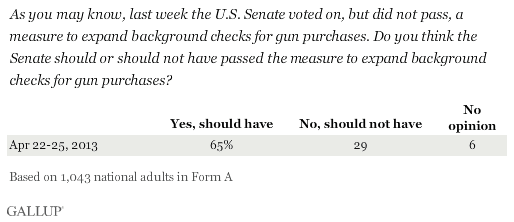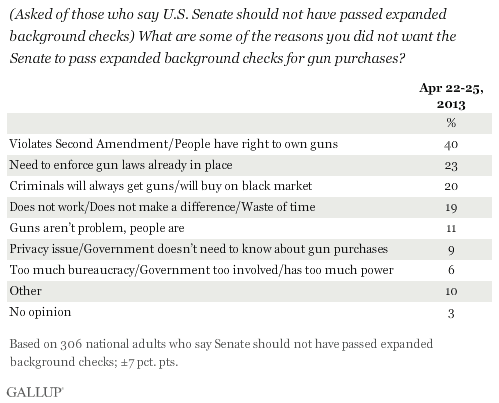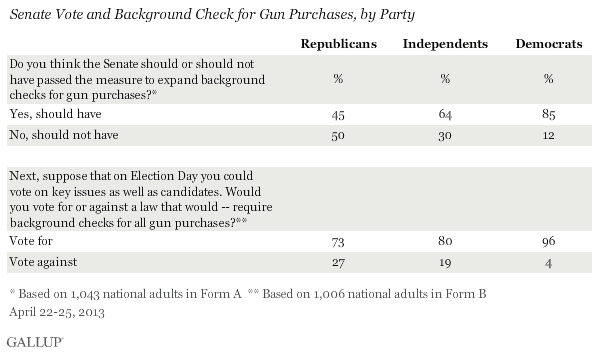PRINCETON, NJ -- Sixty-five percent of Americans say the U.S. Senate should have passed the measure that would have expanded background checks for gun purchases, while 29% agree with the Senate's failure to pass the measure.

These data are from Gallup Daily tracking conducted April 22-25, about a week after the Senate's April 17 vote on the background check measure, which failed when 54 senators voted "yea," short of the 60 votes needed to avoid a filibuster and pass the measure.
Prior to the Senate's failure to pass the measure, numerous polls showed that roughly nine in 10 Americans favor expanded gun background checks in concept -- a fact that a number of journalists, columnists, and politicians made note of. Gallup's Jan. 19-20 survey, for example, showed that 91% of Americans said they personally would vote for a measure requiring criminal background checks for all gun sales. Gallup asked this question again in the April 22-25 survey and found a slight decline, to 83% support. The wording of the new question was slightly modified from the January asking, which may be responsible for some of the change. But it also may be that the Senate's failure to pass the measure deflated Americans' support for it.

Regardless of whether one looks at the 91% or the 83% support level, it is clear that more Americans support the concept of a law expanding background checks for gun purchases than say the Senate should have passed such a law.
Those Against Passage Most Likely to Cite Second Amendment
Gallup asked Americans who said they believed the Senate should not have passed the background check measure to explain why in their own words.
The results reflect a mixed pattern of explanations for opposition. Some of the reasons are clearly based on a fundamental, negative reaction to the concept of the gun control measure per se, including 40% who say the measure would have violated the Second Amendment, and 9% who say the measure would have violated Americans' privacy.
Other responses suggest that opposition to the Senate measure stems in part from negative reaction to either the need for the legislation, or concerns about its efficacy. These explanations include the 23% who say there is a need to enforce laws already in place and 20% who say the legislation wouldn't work because criminals would find guns anyway. Another 19% say the measure wouldn't work in general; 11% say people, not guns, are the problem (an indirect statement about the measure's effectiveness); and 6% say the government already has too much power.

Both questions -- the one asking about the Senate vote, and the referendum asking whether respondents would themselves vote for a law -- refer to the concept of new legislation. Presumably the types of objections to the Senate bill noted above could also pertain to the law asked about in the referendum question.
Thus, these explanations do not necessarily help explain the discrepancy between the support level for the Senate bill and the support for a law voted on in a national referendum. But they do highlight that some opponents of the Senate bill apparently have concerns about not just the content of the bill, but also its effectiveness.
Republicans Least Supportive of Background Checks
Republicans, independents, and Democrats are all less likely to support Senate passage of a background check measure than to say they personally would vote for such a measure if it were a national referendum. Still, there are significant partisan differences in responses to both questions. Republicans are less likely than independents or Democrats to support either the Senate bill or the more direct personal vote on background check laws. Republicans' negativity is most pronounced in terms of the Senate vote, with less than half saying the Senate should have passed the bill. While it is unclear to what extent Republican respondents are aware of the specifics of the Senate actions, nearly all Republican senators voted against the measure -- and the Senate is controlled by the Democrats, which could encourage Republicans' antipathy toward anything the Senate does. Partisans may have also taken their cues on how to think about certain proposals from their favored party's leaders.

Implications
These results show broader support for the underlying concept of background checks for gun sales, as measured in a question asking if respondents would vote in a national referendum for such a measure, than for the idea of Congress passing a law that would enact such provisions. The reasons for this difference are not entirely clear, although open-ended questioning shows that opponents of the Senate vote justify their position by giving a number of reasons that go beyond the simple concept of the law itself.
It is also possible that reminding respondents of the Senate's failure to pass the measure could give more weight, authority, or legitimacy to a position opposing the measure than just theoretically talking about the basic idea of expanded background checks.
Still, one bottom-line conclusion from these results is clear: A significant majority of Americans would have preferred that the Senate had passed the measure expanding background checks for gun purchases when it voted on April 17.
Survey Methods
Results for this Gallup poll are based on telephone interviews conducted April 22-25, 2013, on the Gallup Daily tracking survey, with a random sample of 2,049 adults, aged 18 and older, living in all 50 U.S. states and the District of Columbia.
For results based on the total sample of 1,043 national adults interviewed in Form A, one can say with 95% confidence that the margin of sampling error is ±4 percentage points.
For results based on the total sample of 1,006 national adults interviewed in Form B, one can say with 95% confidence that the margin of sampling error is ±4 percentage points.
Interviews are conducted with respondents on landline telephones and cellular phones, with interviews conducted in Spanish for respondents who are primarily Spanish-speaking. Each sample of national adults includes a minimum quota of 50% cellphone respondents and 50% landline respondents, with additional minimum quotas by region. Landline telephone numbers are chosen at random among listed telephone numbers. Cellphone numbers are selected using random digit dial methods. Landline respondents are chosen at random within each household on the basis of which member had the most recent birthday.
Samples are weighted to correct for unequal selection probability, nonresponse, and double coverage of landline and cell users in the two sampling frames. They are also weighted to match the national demographics of gender, age, race, Hispanic ethnicity, education, region, population density, and phone status (cellphone only/landline only/both, cellphone mostly, and having an unlisted landline number). Demographic weighting targets are based on the March 2012 Current Population Survey figures for the aged 18 and older U.S. population. Phone status targets are based on the July-December 2011 National Health Interview Survey. Population density targets are based on the 2010 census. All reported margins of sampling error include the computed design effects for weighting.
In addition to sampling error, question wording and practical difficulties in conducting surveys can introduce error or bias into the findings of public opinion polls.
For more details on Gallup's polling methodology, visit www.gallup.com.
